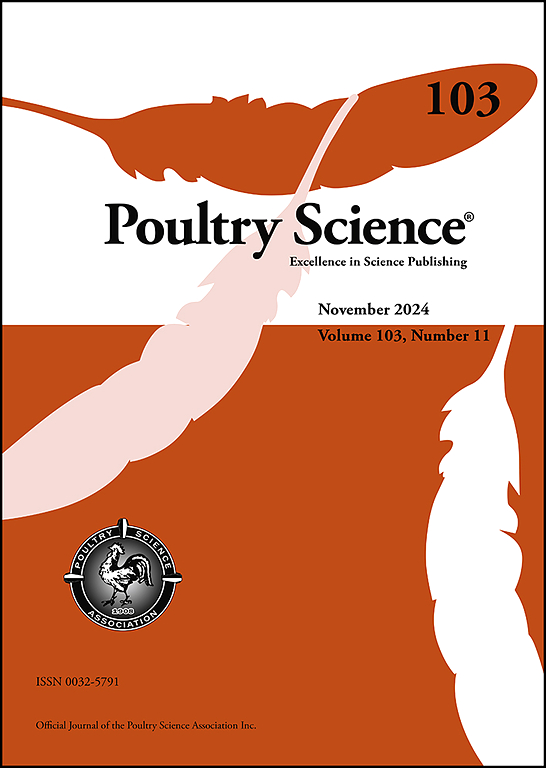Dietary Pediococcus acidilactici supplementation enhances sperm quality and testicular function in roosters
IF 4.2
1区 农林科学
Q1 AGRICULTURE, DAIRY & ANIMAL SCIENCE
引用次数: 0
Abstract
The ban on the use of antibiotics as growth promoters due to resistance issues has urged scientists to find alternatives to antibiotics. In recent years, probiotics have gained widespread attention for their potential benefits on systemic physiological functions. However, little is known about how Pediococcus acidilactici supplementation specifically influences sperm quality, testicular development, and the molecular mechanisms underlying male reproductive performance in roosters. Therefore, this study aimed to evaluate the effects of different levels of Pediococcus acidilactici supplementation on the reproductive performance of roosters. Roosters were randomly assigned to four groups: a control group (fed a basal diet) and three treatment groups supplemented with Pediococcus acidilactici at P1 (1 × 108), P2 (1 × 109), and P3 (1 × 1010) CFU/mL. Over a five-week trial period, semen parameters, motility, viability, mitochondrial membrane potential, apoptosis, protamine deficiency, reproductive hormone levels, testicular histological parameters, and transcriptomic profiles were assessed. The results demonstrated that the beneficial effects of Pediococcus acidilactici supplementation on rooster semen quality progressively increased with prolonged feeding duration. Notably, in the final week, compared with the control group, the P2 and P3 groups exhibited significantly improved sperm parameters (P < 0.01), motility (P < 0.05), viability, and mitochondrial function (P < 0.01), while apoptosis (P < 0.05) and protamine deficiency (P < 0.01) were significantly reduced. Additionally, reproductive hormone levels, testicular histology, and testicular antioxidant capacity were also significantly improved in the P2 and P3 groups (P < 0.05). Finally, transcriptomic analysis identified five key genes (RAF1, PIK3R1, ATRX, ARID4A, and SOX9) and four signaling pathways involved in testicular development. These findings suggest that supplementation with an appropriate level of Pediococcus acidilactici, particularly at 1 × 109 CFU/mL, probably can enhance the reproductive capacity of roosters by improving sperm quality and testicular development.
饲粮中添加酸活性球球菌可提高公鸡精子质量和睾丸功能
由于耐药性问题,禁止使用抗生素作为生长促进剂,这促使科学家们寻找抗生素的替代品。近年来,益生菌因其对全身生理功能的潜在益处而受到广泛关注。然而,对于补充酸化Pediococcus acid actitici如何特异性影响公鸡的精子质量、睾丸发育以及雄性生殖性能的分子机制,人们知之甚少。因此,本研究旨在评价饲粮中添加不同水平的酸化Pediococcus对公鸡繁殖性能的影响。试验公鸡随机分为4组:对照组(饲喂基础饲粮)和3个试验组,分别在P1 (1 × 108)、P2 (1 × 109)和P3 (1 × 1010) CFU/mL水平上添加酸化Pediococcus。在为期五周的试验期间,评估精液参数、活力、活力、线粒体膜电位、凋亡、鱼精蛋白缺乏、生殖激素水平、睾丸组织学参数和转录组学特征。结果表明,随着饲养时间的延长,饲粮中添加酸活性Pediococcus对公鸡精液质量的改善作用逐渐增强。值得注意的是,在最后一周,与对照组相比,P2和P3组的精子参数明显改善(P <;0.01),运动性(P <;0.05)、活力和线粒体功能(P <;细胞凋亡(P <;0.05)和鱼精蛋白缺乏(P <;0.01)显著降低。此外,P2和P3组生殖激素水平、睾丸组织学和睾丸抗氧化能力也显著提高(P <;0.05)。最后,转录组学分析确定了参与睾丸发育的5个关键基因(RAF1、PIK3R1、ATRX、ARID4A和SOX9)和4条信号通路。上述结果提示,在鸡粮中添加适量的酸碱Pediococcus acilacactii,特别是添加1 × 109 CFU/mL,可能通过改善精子质量和睾丸发育来提高公鸡的生殖能力。
本文章由计算机程序翻译,如有差异,请以英文原文为准。
求助全文
约1分钟内获得全文
求助全文
来源期刊

Poultry Science
农林科学-奶制品与动物科学
CiteScore
7.60
自引率
15.90%
发文量
0
审稿时长
94 days
期刊介绍:
First self-published in 1921, Poultry Science is an internationally renowned monthly journal, known as the authoritative source for a broad range of poultry information and high-caliber research. The journal plays a pivotal role in the dissemination of preeminent poultry-related knowledge across all disciplines. As of January 2020, Poultry Science will become an Open Access journal with no subscription charges, meaning authors who publish here can make their research immediately, permanently, and freely accessible worldwide while retaining copyright to their work. Papers submitted for publication after October 1, 2019 will be published as Open Access papers.
An international journal, Poultry Science publishes original papers, research notes, symposium papers, and reviews of basic science as applied to poultry. This authoritative source of poultry information is consistently ranked by ISI Impact Factor as one of the top 10 agriculture, dairy and animal science journals to deliver high-caliber research. Currently it is the highest-ranked (by Impact Factor and Eigenfactor) journal dedicated to publishing poultry research. Subject areas include breeding, genetics, education, production, management, environment, health, behavior, welfare, immunology, molecular biology, metabolism, nutrition, physiology, reproduction, processing, and products.
 求助内容:
求助内容: 应助结果提醒方式:
应助结果提醒方式:


